| Pages:
1
..
49
50
51
52
53
..
77 |
RogueRose
International Hazard
    
Posts: 1596
Registered: 16-6-2014
Member Is Offline
|
|
Here are some pretty neat Sulfur needles that formed as a solution of hot toluene cooled. I was under the impression that the Ag grade "dusting
sulfur" was ~90% sulfur and 10% anti-caking like CaCO3 (IDK if that is true). The thing is all the sulfur fully dissolved in the toluene in a hot
water bath. Would the CaCO3 dissolve in toluene? (I think not) - could there be something else? I always saw pure sulfur crystals as a beautiful
clearish yellow, shinny.
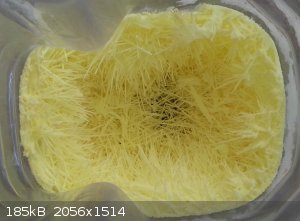
The strange thing about CuSO4 is depending upon the temps at which the crystals form, their attributes vary greatly. There are 2 more penta-hydrate
crystal types that I didn't show, they are cubic like and dark blue and the other is in between table salt size and canning salt and a little lighter
blue than the dark blue in the below image.
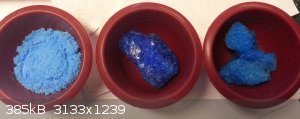
I believe this was the result of trying a re-crystalization with pure water. A saturated solution was boiled down until most water was gone (like
90%). The boiling liquid was poured into a SS pan and almost all the liquid crystallized into this powderish form. This form seems very nice to work
with if it needs to be dissolved quickly in water.
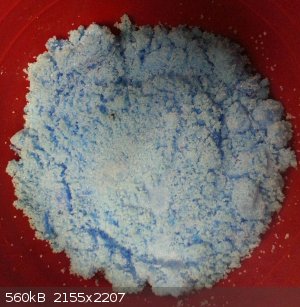 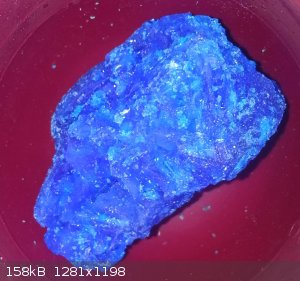
This is the strangest crystal form I found and I havent' been able to replicate it. It is heptahydrate and some call it "ice" or "snow" crystals -
these don't melt. I think these happened from a medium saturated solution at ~ 90F then placed in a freezer until it reached almost 0F. I did
similar before and got cubic dark blue crystals when the solution was fully saturated.
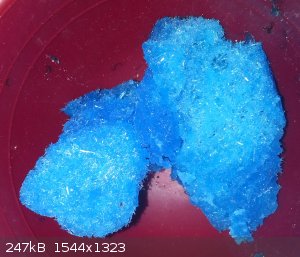
This is the result of placing a 60% saturated (saturated with CuSO4 compared to water and probably 25% H2SO4 by volume) solution in a
slow-cooker/crock pot and allowing to evaporate slowly. Solution was dark blue when starting. This shows that it has dehydrated below the
pentahydrate form to possibly tri-hydrate??
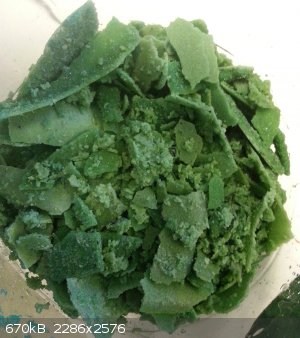
This is similar to the above but but a higher wattage slow cooker was used, thus allowing to get to the brown stage which I believe is a mono hydrate.
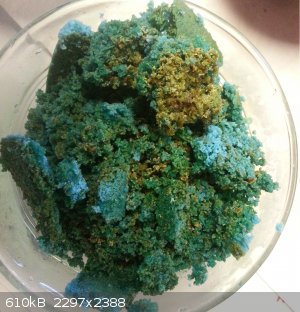
FeSO4 - Steel plate was added to hot H2SO4 and some H2O2 and the result was these green crystals and some rust (brown/red). I was really amazed how
much formed from such little amount of solution.
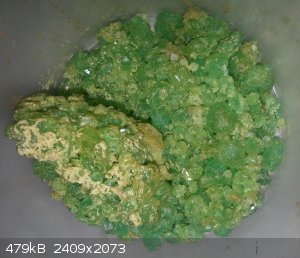 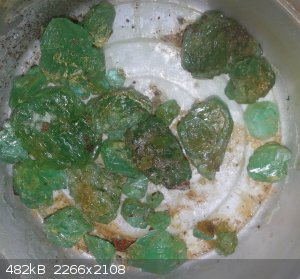
Just some CuSO4 that originally was just king of moist but has turned into clear and hardish crystals on the bottom.
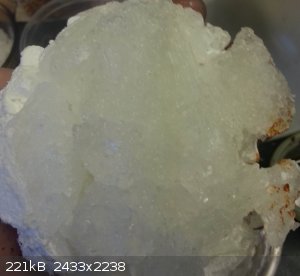 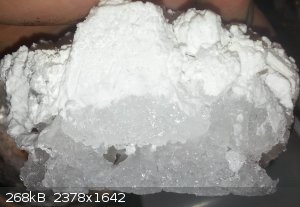
|
|
|
DraconicAcid
International Hazard
    
Posts: 4360
Registered: 1-2-2013
Location: The tiniest college campus ever....
Member Is Offline
Mood: Semi-victorious.
|
|
The really light blue crystals may be the trihydrate. The green stuff you have is definitely not the trihydrate (which is blue), but may be a
hydrogen sulphate. The bottom pictures aren't CuSO4- did you mean CaSO4?
Nice crystals, though.
Please remember: "Filtrate" is not a verb.
Write up your lab reports the way your instructor wants them, not the way your ex-instructor wants them.
|
|
|
Chemetix
Hazard to Others
  
Posts: 376
Registered: 23-9-2016
Location: Oztrayleeyah
Member Is Offline
Mood: Wavering between lucidity and madness
|
|
Some chili powder in an ethanol Soxhlet extraction. Found that pentane did a better job.
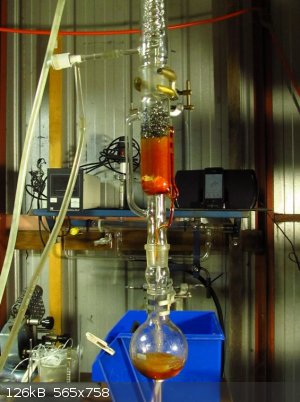 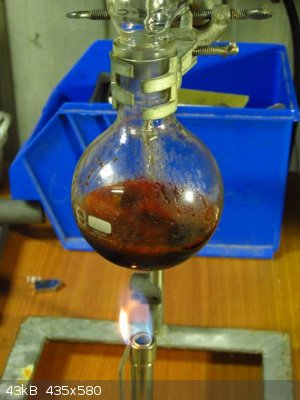
[Edited on 29-9-2016 by Chemetix]
|
|
|
RogueRose
International Hazard
    
Posts: 1596
Registered: 16-6-2014
Member Is Offline
|
|
Quote: Originally posted by DraconicAcid  | The really light blue crystals may be the trihydrate. The green stuff you have is definitely not the trihydrate (which is blue), but may be a
hydrogen sulphate. The bottom pictures aren't CuSO4- did you mean CaSO4?
Nice crystals, though. |
Thanks for pointing that out. I had made the change before posting I don't know how it got back. Why is there no edit button?
As far as the green/brown, that always seems to happen when I heat CuSO4 in an oven (even covered so not exposed directly to the element). As soon as
it comes in contact with water it turns blue again. Is that expected?
|
|
|
Tsjerk
International Hazard
    
Posts: 3032
Registered: 20-4-2005
Location: Netherlands
Member Is Offline
Mood: Mood
|
|
A better job at what? Extracting capsaicine?
|
|
|
HeYBrO
Hazard to Others
  
Posts: 289
Registered: 6-12-2013
Location: 'straya
Member Is Offline
Mood: 
|
|
Quote: Originally posted by Chemetix  | Some chili powder in an ethanol Soxhlet extraction. Found that pentane did a better job.
[Edited on 29-9-2016 by Chemetix] |
cool to see an aussie shed. But get a hotplate!!!! It is very dangerous to boil a flammable solvent with a bunsen burner.
|
|
|
aga
Forum Drunkard
    
Posts: 7030
Registered: 25-3-2014
Member Is Offline
|
|
I got a hotplate/stirrer but still prefer an open flame for most distillations, including ethanol, acetone etc.
Looks better for starters !
|
|
|
RogueRose
International Hazard
    
Posts: 1596
Registered: 16-6-2014
Member Is Offline
|
|
Id like to add some pics to the other CuSO4 images I posted just above. I had been bubbling air (2CFM) through ~20% H2SO4 with about 25-30lbs Cu
wire. I ended up[ with an unusual green blue instead of the various shades of blue (darker, more sulfate was present). I then removed the liquid and
evaporated in "slow cookers" crock pots and it resulted in the olive green images above (and first image below) and the concentrated liquid had turned
almost black.
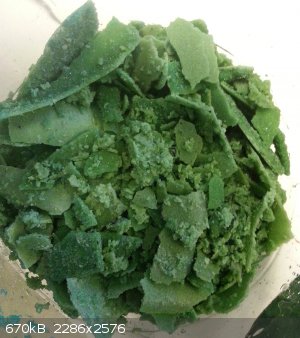
This is the remaining acid after the green crystals had been removed
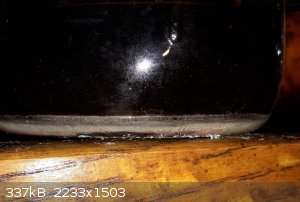
Here is the same acid but a hotter cooker was used and there looks to be anyhdrous (white) CuSO4 at the bottom and just above the layer there looks
like copper crystals/powder for about an inche above the brown layer above the white layer.
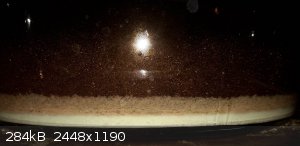
As the bubbling didn't seem to work ANYWHERE near as well as 35% H2O2 (I had bubbled 96+ hours so like close to 400lbs of pure O2), I decided to add
1/3 cup of 35% H2O2 and 2/3 cup of ~85-95% H2SO4 with copper wire and flattened pipe. The black acid turned green then blue and fizzed. I ended up
with this below, it was like a paste.
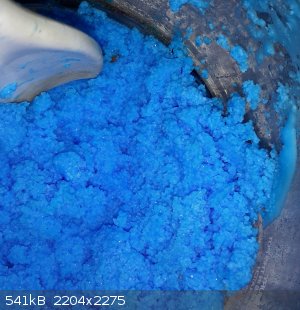
I poured the remaining water into another coffee pot and then scraped the CuSO4 off the copper (about 90% removed). I then added 2/3C H2O2 (added to
the blue liquid from the last batch) and another 1.33 cup of the acid along with the remaining wire. After about 10 mins of slow to moderate fizzing
(temp was probably 120-150F) fizzing stopped and liquid was dark blue. I then removed any reaming copper so it didn't get stuck in the crystals. It
slowly cooled to room temp and this is what the results are:
The next 2 pics are same container, just different angles
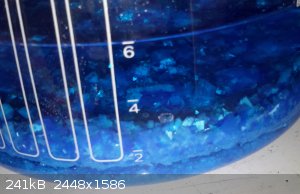
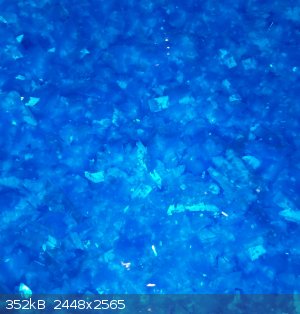
I would have to say that I got higher yields using about 1C 35% H2O2 than running a 2CFM bubbler (with a ~40 sq inch diffuser - SUPER FINE bubbling -
traveling 2ft up through the acid mix then reaching the last 1ft of solid mix of copper wire (tons of surface area and packed semi-tightly. The CuSO4
should have sank to the bottom.) I calculated that 4 days should have given about 400lbs of pure O2 (plus nitrogen, CO2 but that is additional
weight) - The O2 is just not working like the H2O2 - no where close.
I'm trying to figure out how to increase the oxidation or make the H2O2 myself.
|
|
|
Chemetix
Hazard to Others
  
Posts: 376
Registered: 23-9-2016
Location: Oztrayleeyah
Member Is Offline
Mood: Wavering between lucidity and madness
|
|
Capsaicin extracts ok with ethanol, but pentane takes all the oils and resins as well, the aim was to produce something that could be sprayed around
the garden to stop some marauding rodents from chewing my vegetables and lemons. (they were chewing the skins off the lemons? go figure?)
Hotplates and mantles are verboten in Aus. I've never had any problems with cracked glass or fire when running these sort of small distillation or
reflux operations.
|
|
|
j_sum1
Administrator
       
Posts: 6338
Registered: 4-10-2014
Location: At home
Member Is Offline
Mood: Most of the ducks are in a row
|
|
Well I have a mantle. Hotplates are readily available too. (Mine are non-stirring kitchen type and so have limitations but they do work.) You could
also use a paint-stripping heat gun.
IOW, there are heating solutions that are readily available that can eliminate the need for open flame. And there are some hazards with open flame.
If you prefer to use a flame for some reason (and I do occasionally) then that is your decision. But don't blame the legal situation for your choice.
|
|
|
Chemetix
Hazard to Others
  
Posts: 376
Registered: 23-9-2016
Location: Oztrayleeyah
Member Is Offline
Mood: Wavering between lucidity and madness
|
|
My choice is to never post doing or admit to possessing anything illegal online, and that is a risk management strategy as much as anything-but this
belongs in another thread really. I guess I'm a little paranoid about being perceived as breaking the law. I just made mention of the difficulty
surrounding these items here for the benefit of others. My decision to use an open flame is based on the better heat coupling that overcomes the
hysteresis when the soxhlet empties. Risks can and should always be managed.
[Edited on 1-10-2016 by Chemetix]
|
|
|
j_sum1
Administrator
       
Posts: 6338
Registered: 4-10-2014
Location: At home
Member Is Offline
Mood: Most of the ducks are in a row
|
|
Ok. But "verboten" was not the word you needed. It is not illegal to have mantle or a hotplate. Even if they are watched items.
|
|
|
Dmishin
Harmless

Posts: 32
Registered: 5-10-2015
Member Is Offline
Mood: No Mood
|
|
I've accidentally made some ferrate(VI) solution while oxidizing FeCO3 by bleach, so decided to make a "family photo" of differently
colored iron compounds.
Compounds, in reading order:
Sodium ferrate(IV)
Iron(III) oxide hydroxide
Ferric alum (covered with a layer of aluminum analog)
Sodium tris-oxalato ferrate(III)
Mohr's salt
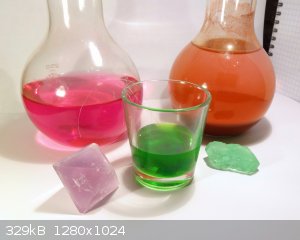
|
|
|
Dwarvensilver
Hazard to Self
 
Posts: 52
Registered: 8-6-2016
Member Is Offline
Mood: Constantly Chemically Amazed
|
|
Quite a few colors considering that when you or me anyway, thinks of iron, I think like brown, not red green a purple lol
Nice Pic Dmishin
|
|
|
Dwarvensilver
Hazard to Self
 
Posts: 52
Registered: 8-6-2016
Member Is Offline
Mood: Constantly Chemically Amazed
|
|
Here is a pic of Sulphur trees, I am always surprised with the way different things crystalize.
<a href="http://s901.photobucket.com/user/Dwrvnsilver/media/Chemistry/c0a613e2-429a-40d4-ae3a-9a8788be3f0e.jpg.html" target="_blank"><img
src="http://i901.photobucket.com/albums/ac220/Dwrvnsilver/Chemistry/c0a613e2-429a-40d4-ae3a-9a8788be3f0e.jpg" border="0" alt=" photo
c0a613e2-429a-40d4-ae3a-9a8788be3f0e.jpg"/></a>
|
|
|
j_sum1
Administrator
       
Posts: 6338
Registered: 4-10-2014
Location: At home
Member Is Offline
Mood: Most of the ducks are in a row
|
|
Quote: Originally posted by Dmishin  | | I've accidentally made some ferrate(VI) solution while oxidizing FeCO3 by bleach, so decided to make a "family photo" of differently colored iron
compounds. |
Huh?
I had no idea that ferrate was that easy to create. I should give it a try.
Lovely photo.
If you have some potassium ferrocyanide / potassium ferrocyanide you have a couple more colours and can also get the Prussian blue. And with some
thiocyanate you get blood-red. That is if you want an extended family photoshoot.
|
|
|
Cryolite.
Hazard to Others
  
Posts: 269
Registered: 28-6-2016
Location: CA
Member Is Offline
Mood: No Mood
|
|
Iron salicylate is purple too-- maybe add that one in?
|
|
|
fluorescence
Hazard to Others
  
Posts: 285
Registered: 11-11-2013
Member Is Offline
Mood: So cold outside
|
|
Set the equilibrium between Chloride and Aqua ligand for Co(II) so it changes to blue at boiling conditions. I first used KCl but as it wouldn't work
(even precipitated) I changed it to HCl and just took the clear solution above. So this solution was KCl saturated in summer having 25°C and now it
is slowly getting colder in my lab to about 10°C which caused the KCl to slowly crystallize.
At first I was a bit surprised by the shape but then I found pictures of so called crystal clusters which look similar. Still a strange shape to me.
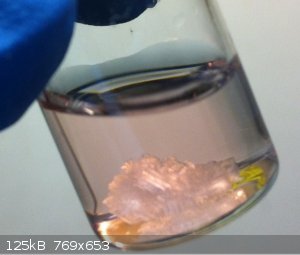
|
|
|
Dwarvensilver
Hazard to Self
 
Posts: 52
Registered: 8-6-2016
Member Is Offline
Mood: Constantly Chemically Amazed
|
|
KCl Crystals
Nice KCl crystals
I have not tried to grow KCl crystals yet, NaCl was my first crystallization for many years and now I am hooked.
I have just dissolved KCl and NaCl in stoichiometric ratio
(18g NaCl, 22g KCl in 100g H2O, I went with these numbers as I figured if 36g NaCl and dissolves in 100mL @20øC and KCl 34.2g, I would take half of
NaCl and 23.1g 0.3 mol KCl to make up the solute) This sound right?
RogueRose posed the question if anyone had tried NaCl and KCl crystallization and so I thought why not.
Now to wait for seeds and the growth 
Will post the photos.
|
|
|
crystal grower
Hazard to Others
  
Posts: 474
Registered: 3-1-2016
Location: Os Petrosum
Member Is Offline
Mood: Puzzled
|
|
KCl forms hopper crystals very similiar to bistmuth, when I tried crystallizing KCl for the first time I was quite suprised too.
|
|
|
Dwarvensilver
Hazard to Self
 
Posts: 52
Registered: 8-6-2016
Member Is Offline
Mood: Constantly Chemically Amazed
|
|
Interesting, Makes me wonder what the hopper face KCl and NaCl cubic combination will look like  . .
I crystallized Sodium Nitrate, it makes quite water clear crystals butt also hopper faced. I will have to do a set of KNO3 and NaNO3 now too lol
The hopper face crystal in the middle of the CuSO4 chunk is NaNO3.
It is just there for decoration cause I have not taken the time to set up displays of some sort.
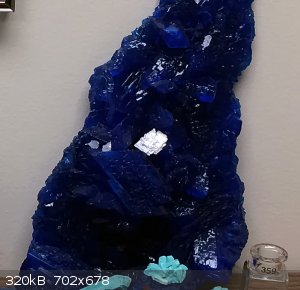
|
|
|
Dwarvensilver
Hazard to Self
 
Posts: 52
Registered: 8-6-2016
Member Is Offline
Mood: Constantly Chemically Amazed
|
|
@RogueRose
Hi Rose,
Speaking of Sulfur, those are awesome sulfur crystals, I only got miniature crystals from 90 C Toluene on cooling and evaporation.
I have tried twice with Carbon disulphide as the solvent. This resulted in crystals both times but not what I was trying for.
Close, but solvent evaporated in the fume hood over the weekend both times and did not allow time for seed collection and suspension.
I tried on Wednesday to suspend a seed, it melted. On Friday there was nothing but an inch of darker yellow solvent and on Monday I came in to 1/4"
solvent and pic below.
It gave me a surprise tho, who knew that a sulfur crystal could be crystal clear yellow with glass smooth sides and sounds like glass when you bump
it. Rhombic crystal coming soon 
[img]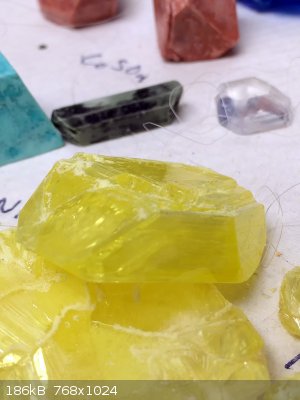 [/img] [/img]
|
|
|
DraconicAcid
International Hazard
    
Posts: 4360
Registered: 1-2-2013
Location: The tiniest college campus ever....
Member Is Offline
Mood: Semi-victorious.
|
|
The four faces of vanadium. I've very pleased that I was able to get V(II) by reducing the solution with aluminum wire, and didn't have to muck
around with zinc amalgam.
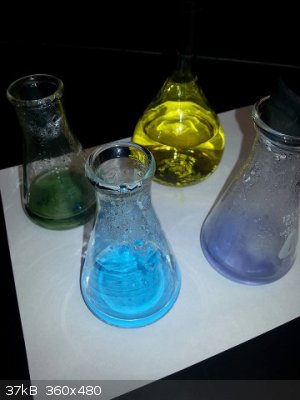
Please remember: "Filtrate" is not a verb.
Write up your lab reports the way your instructor wants them, not the way your ex-instructor wants them.
|
|
|
Dwarvensilver
Hazard to Self
 
Posts: 52
Registered: 8-6-2016
Member Is Offline
Mood: Constantly Chemically Amazed
|
|
Nicely Done Sir!
those look Awsome
|
|
|
DraconicAcid
International Hazard
    
Posts: 4360
Registered: 1-2-2013
Location: The tiniest college campus ever....
Member Is Offline
Mood: Semi-victorious.
|
|
Thanks. Now I need to figure out what kind of crystals I can grow containing vanadium......
KV(SO4)2*12H2O should be do-able.
ETA: Hmmm....I've found an electrolytic prep for NH4V(SO4)2*12H2O, and a prep for an oxalato complex....but I'm not finding much else. Making the
glycinate V(gly)3 requires anhydrous conditions...Weird. I had assumed its coordination chemistry would be similar to chromium. Proves what they say
about assume....
[Edited on 19-10-2016 by DraconicAcid]
Please remember: "Filtrate" is not a verb.
Write up your lab reports the way your instructor wants them, not the way your ex-instructor wants them.
|
|
|
| Pages:
1
..
49
50
51
52
53
..
77 |